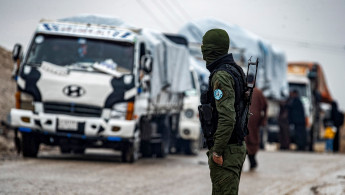Family accuses Syria Kurdish force of torturing son to death
A family has accused Kurdish forces in northeast Syria of torturing to death a detained relative, sparking a social media uproar despite the denial of Kurdish authorities.
The accusations came from the family of Amin Issa al-Ahmad, a 34-year-old who was detained by the Kurdish Asayish security forces on May 22, allegedly on charges of corruption and bribery.
His family received his corpse on Monday and charged in a statement the next day that it bore signs of torture.
A medical examiner hired by the family detected a "fractured jaw and bleeding in the skull", the statement said.
There were also "bruises on the knees... the neck, and the back of the head," as well as burns, it added.
The family said it held the Kurdish administration responsible for the "death of our son under torture, since it is a de-facto government responsible for the safety and security of all citizens living in areas under its control".
The allegations are the strongest and most direct accusations of torture yet against the US-backed Kurdish authorities who have carved out a semi-autonomous region in Syria's northeast following years of war.
The Kurdish administration has denied the allegations.
Amin Issa, 35-year-old Kurdish youth killed under torture in US-funded #YPG prisons in NE #Syria, after being kidnapped 12 days ago — Rebaz News pic.twitter.com/m2vnbRDRGX
— Harun Alaswad (@harun_alaswad) June 29, 2021
A judicial body linked to the administration, citing medical reports, on Tuesday said Amin had died "of a stroke", and not of torture.
It said there were no traces of "beating... or torture" on his body and claimed it had invited the family to select its own doctors for further examination.
But "the body was received and buried by the family without any medical examination," it said.
Amin's family published pictures showing him with a bloodied, swollen face, and with large red marks on his body.
The Kurdish administration said the images were fabricated and released footage of Issa's corpse that did not show any evidence of abuse.
On social media networks, Kurdish activists were among the many users pressing Kurdish authorities to investigate the death.
Kurdish authorities regularly tout themselves as a model of democratic rule in war-torn Syria.
But critics accuse Kurdish-led forces of having recruited child soldiers and the administration of having detained political opponents, charges they deny.





 Follow the Middle East's top stories in English at The New Arab on Google News
Follow the Middle East's top stories in English at The New Arab on Google News


